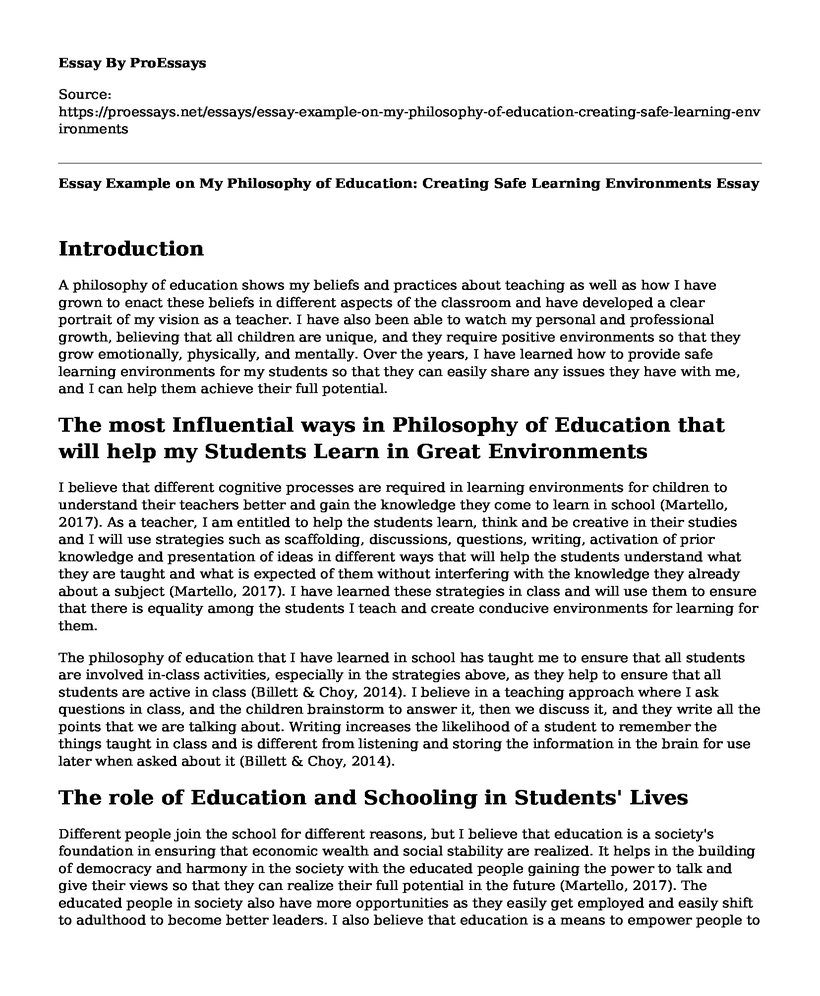Introduction
A philosophy of education shows my beliefs and practices about teaching as well as how I have grown to enact these beliefs in different aspects of the classroom and have developed a clear portrait of my vision as a teacher. I have also been able to watch my personal and professional growth, believing that all children are unique, and they require positive environments so that they grow emotionally, physically, and mentally. Over the years, I have learned how to provide safe learning environments for my students so that they can easily share any issues they have with me, and I can help them achieve their full potential.
The most Influential ways in Philosophy of Education that will help my Students Learn in Great Environments
I believe that different cognitive processes are required in learning environments for children to understand their teachers better and gain the knowledge they come to learn in school (Martello, 2017). As a teacher, I am entitled to help the students learn, think and be creative in their studies and I will use strategies such as scaffolding, discussions, questions, writing, activation of prior knowledge and presentation of ideas in different ways that will help the students understand what they are taught and what is expected of them without interfering with the knowledge they already about a subject (Martello, 2017). I have learned these strategies in class and will use them to ensure that there is equality among the students I teach and create conducive environments for learning for them.
The philosophy of education that I have learned in school has taught me to ensure that all students are involved in-class activities, especially in the strategies above, as they help to ensure that all students are active in class (Billett & Choy, 2014). I believe in a teaching approach where I ask questions in class, and the children brainstorm to answer it, then we discuss it, and they write all the points that we are talking about. Writing increases the likelihood of a student to remember the things taught in class and is different from listening and storing the information in the brain for use later when asked about it (Billett & Choy, 2014).
The role of Education and Schooling in Students' Lives
Different people join the school for different reasons, but I believe that education is a society's foundation in ensuring that economic wealth and social stability are realized. It helps in the building of democracy and harmony in the society with the educated people gaining the power to talk and give their views so that they can realize their full potential in the future (Martello, 2017). The educated people in society also have more opportunities as they easily get employed and easily shift to adulthood to become better leaders. I also believe that education is a means to empower people to become active participants.
Schooling Experience Inventory
My technique of philosophy education is similar to Bloom's taxonomy, which answers the questions, "Where do we begin in seeking to improve human thinking?" From my previous years in school, I have come to believe that as a teacher, I do not have to start from scratch because learning begins since the time a kid is born to the period they join the school, and the learning continues (Forehand, 2010). The thinking behaviors required in the process of learning include the cognitive, the psychomotor, and the affective, and they all serve the purpose of developing the learning process of the learners in the class. I will adopt these behaviors to ensure that the learners are well prepared with the necessary expertise to face the world after they are out of school.
References
Billett, S., & Choy, S. (2014). Learning at working: Emerging perspectives and new challenges. https://pdfs.semanticscholar.org/031f/ed44290880662107503bc277251474b368ba.pdf?_ga=2.265287183.1614848487.1584476356-1434679776.1571778286
Forehand, M. (2010). Bloom's taxonomy. Emerging perspectives on learning, teaching, and technology, 41(4), 47-56. https://www.d41.org/cms/lib/IL01904672/Centricity/Domain/422/BloomsTaxonomy.pdf
Martello, M. B. (2017). The Use of Visual Arts in World Language Instruction to Increase Student Motivation and Attitude. https://scholarworks.boisestate.edu/cgi/viewcontent.cgi?article=2455&context=td
Ng, C. H., & Cheung, Y. L. (2018). Mediation is a socio-cognitive approach to writing for elementary students: Instructional scaffolding. Education Sciences, 8(3), 92. https://pdfs.semanticscholar.org/f2f9/a2cf878231793c839d7a9f0054407b045983.pdf
Cite this page
Essay Example on My Philosophy of Education: Creating Safe Learning Environments. (2023, Apr 24). Retrieved from https://proessays.net/essays/essay-example-on-my-philosophy-of-education-creating-safe-learning-environments
If you are the original author of this essay and no longer wish to have it published on the ProEssays website, please click below to request its removal:
- Portfolio and Reflection for ENGL108
- Determining Personal Truth Essay Example
- Personal Identity by Parfit and Swinburne Essay Example
- Leadership and Ethical Decision Making Essay Example
- Business Ethics Reflection Essay Example
- Paper Example on People's Identity Construction on Social Media Platforms
- Parents of ASC Pupils: Supported by School Staff in EHCP Reviews - Essay Sample







